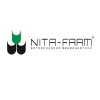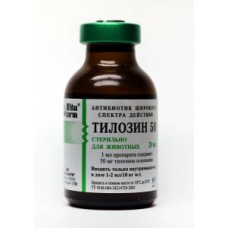Expiration date: 01/2026
It is a drug developed specifically for the treatment of infectious diseases in animals: cattle, dogs and cats, horses, birds, etc.among the medicines of human medicine, Tylosin has no Analogues.
Tylosin is an antibiotic of natural (natural) origin. How to understand this: according to their method of obtaining antibiotics differ in:
- Natural;
- Synthetic;
- Semi-synthetic.
Antibiotics of natural origin are produced by fungi (penicillin) and actinomycetes. They can also be obtained from plants (phytoncids), bacteria (polymyxins) and animal and fish tissues.
Semi-synthetic antibiotics are obtained by biosynthesis with subsequent chemical modifications: the original molecule of a natural antibiotic obtained as a result of biological synthesis is modified, for example, by attaching radicals to it. This leads to the fact that the antimicrobial and pharmacological properties of the drug are improved.
Synthetic antibiotics are chemical analogues of natural antibiotics.
According to its classification Tylosin belongs to the macrolide. Macrolides-antibiotics with a complex structure, which have a bacteriostatic effect, ie substances inhibit the reproduction of bacteria. Antibiotics of this group are considered to be less toxic.
The description of the drug
It is a solution for injection in the form of a transparent liquid with a pale yellow tint. The drug has a specific smell.
Action tyrosinases active ingredient is tylosin.
Auxiliary substance:
- Distilled water;
- Propylene glycol;
- Benzyl alcohol.
Available in bottles of 20, 50ml and 100 ml.
The opened bottle is allowed to use no more than 30 days.
When turbidity or flakes appear in the bottle, the use of the solution is strictly prohibited.
Each package is accompanied by a detailed instruction on the use of the drug, indicating the dosages for different types of Pets and birds.
Pharmacological properties of the drug Tylosin 50
- Antibacterial action;
- Has a negative impact on streptococci and staphylococci (they cause pneumonia in animals);
- Inhibits protein synthesis of pathological microorganisms;
- The therapeutic effect remains for days after getting the drug into the body. Excreted from the body of animals (and birds) with urine and bile (cows and goats excreted with milk);
- Tylosin 50 is administered intramuscularly, which ensures its immediate entry into the blood. The highest concentration of the substance in the tissues is observed after 60 minutes after administration.
The drug Tylosin 50 equally well copes with infectious diseases of cattle, Pets, birds. Many bacterial pathologies of animals can become indications for the use of this antibiotic. The optimal dose of the drug for different species of animals is described in the instructions to the drug.
Indications for use
Application tyrosinaemia is assigned as a therapeutic tool for the treatment and as a preventive measure against infectious diseases caused by Tylosin-sensitive pathogens. In addition, this tool can be used to treat secondary infections during the "heyday" of viral epidemics.
Tylosin 50 has different effects on different animals: the instructions for use for the treatment of pigs will be different from the instructions for use for cats or birds.
Usually Tylosin 50 is used in veterinary medicine for the treatment of such diseases:
- Mastitis-inflammation of the mammary glands;
- Arthritis - inflammation of the joints;
- Atrophic rhinitis — with this disease there is thinning, atrophy of the mucous membranes of the nasal cavity;
- Bronchopneumonia is an infectious lung disease affecting only small areas of the lungs;
- Dysentery — an intestinal infection;
- Enzootic pneumonia is a chronic infectious inflammation that affects pigs. In this disease, lung damage occurs, the animal begins to linger in growth, development;
- Infectious agalactia-this disease is most prone to goats and sheep in the lactation period. This inflammation affects the mammary glands of animals, joints and vision;
- Secondary infectious manifestations of viral diseases.
Side effects, contraindications
This drug has virtually no adverse reactions. However, in extremely rare cases can be observed:
- The emergence of respiratory phenomena;
- Allergic reactions in the form of erythema (a skin disease characterized by the appearance of flaky spots on the skin that cause itching);
- Allergies in the form of edema;
- In pigs-sometimes partial loss of the rectum.
All adverse reactions do not require additional treatment and take place independently after discontinuation of the drug.
Symptoms of an overdose of tylosin were not detected.
Contraindications include only individual hypersensitivity to tylosin.
Treatment
The drug is administered intramuscularly, once every day. The duration of treatment is from 5 days to a week.
The dose of the drug is prescribed taking into account the weight and type of animal according to the instructions. If there is no possibility of consultation with a veterinarian, and you decide to treat yourself, then do the minimum dose of the drug.
The injection should be done every time in a new place to avoid the appearance of bruises and infection.
Treatment of poultry
Tylosin is prescribed for such diseases in birds:
- Chicken runny nose;
- Respiratory infection;
- Necrotic enteritis.
The drug may be administered to birds subcutaneously or orally, with water or feed. In this case, the drug is pre-dissolved in water. Do not allow sunlight to enter the solution. Use a freshly prepared solution each time.
The dosage and course of treatment depends on the disease, the type and weight of the bird.
The effect of the action of Tylosin becomes noticeable on the third day.
Treatment of animals
- Cats, dogs, rabbits-0,1-0,2 ml per 1 kg of pet's body weight;
- Pigs-0.2 ml / kg weight;
- Sheep, goats-0,2-0,24 ml / kg;
- Cattle, calves-0.1-0.2 ml / kg of animal weight.
Special instructions for use with the drug, conditions and shelf life
The drug tylosine injections need to observe the rules of hygiene and safety precautions established for work with the veterinary medicines;
In case of contact with a solution of Tylosin on the skin or mucous membrane, it is recommended to thoroughly wash this place with water;
People with hypersensitivity to tylosin are advised to beware of working with this drug;
If you find allergic reactions with unintentional ingestion of Tylosin in the body, you need to see a doctor.
Storage conditions: Tylosin 50 is recommended to be stored in a cool place, protected from sunlight, out of reach of children. The shelf life of the drug is 24 months from the date of issue, the opened bottle is allowed to use only for a month.
Tylosin-50
- Brand: Nita-Farm




